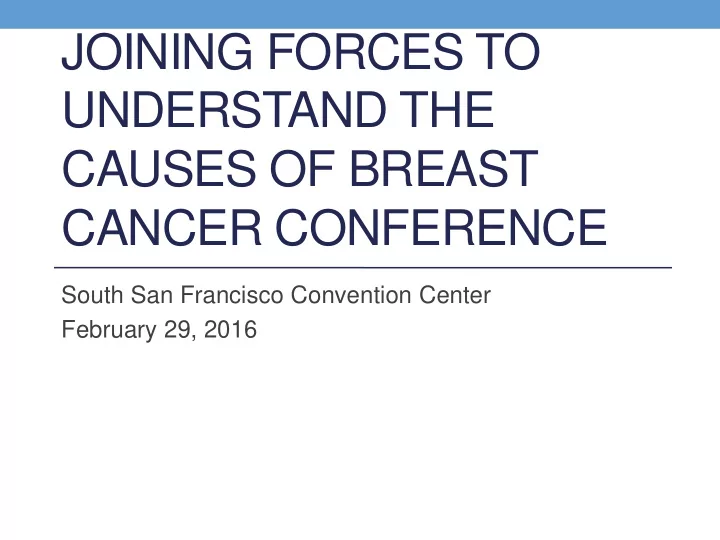

JOINING FORCES TO UNDERSTAND THE CAUSES OF BREAST CANCER CONFERENCE South San Francisco Convention Center February 29, 2016
Conference Goals • Break down barriers between disparate groups and expertise to generate truly multidisciplinary research • Inform public of accomplishments of CBCRP-funded research
Target Audience • Investigators from a wide spectrum of disciplines who are doing breast cancer research • Advocates interested in breast cancer research • Major donors who are interested in supporting breast cancer research
Conference Features to Support Goals • Increase audience interaction by holding a morning and afternoon session of panel presentations followed by structured small group sessions focused on the topic of the panel. • Highlight CBCRP-funded research in the form of posters, short videos and/or session presentations • Control costs by making the event regional and discontinuing scholarships and CME credits
Conference Agenda Welcome : Marjorie Kagawa-Singer, UCLA/California Breast Cancer Research Program Marion Kavanaugh-Lynch, California Breast Cancer Research Program Sharima Rasanayagam, The Breast Cancer Fund/California Breast Cancer Research Program New Model of Breast Cancer Causation : Robert Hiatt, UCSF Dissecting Breast Cancer Causation Moderator: Joan Venticinque, Breast Science Advocacy Core, UCSF Psychosocial, Contextual and Biological Contributors to Causation – Sarah Gehlert, Washington University in St. Louis Breast Cancer Disparities: Factors that Contribute to Causation – Scarlett Lin Gomez, Cancer Prevention Institute of California Environmental Health – Causal Pathways and Opportunities for Intervention– Lauren Zeise, California Office of Environmental Health Hazard Assessment Facilitated Conversations
Conference Agenda Resources for Understanding Breast Cancer Causation, Part 1: Moderator: Naz Sykes, National Breast Cancer Coalition ATHENA: A Model for Assessing Breast Cancer Risk – Laura Esserman, UCSF Studying Real-World Breast Cancer Outcomes - Allison Kurian, Stanford University Resources for Understanding Breast Cancer Causation, Part 2 Panel discussion: Conducting transdisciplinary research Moderator: Janice Barlow, Zero Breast Cancer (retired) HERMOSA: Health and Environment Research on Make of Salinas Adolescents Kim Harley, UC Berkeley • Carolina Mundo, The CHAMACOS Youth Council • Kimberly Parra, Clinica de Salud del Valle de Salinas • Women Firefighters Biomonitoring Collaborative Heather Buren, United Fire Service Women • Rachel Morello Frosch, UC Berkeley • Tony Stefani, San Francisco Fire Department (retired) • Facilitated Conversations Report Back and Closing Reception with Poster Viewing
Conference Financials 2007 2010 2013 2016 Expenses $560,586 $311,797 $280,813 $44,354 Income $0 $0 $14,275 $0 Total Cost $560,586 $311,797 $266,538 $44,354 Total Cost per Year $280,293 $103,932 $83,816 $44,354 Cost per Attendee $1,027 $678 $820 $286
Who Attended? Policy Maker 1% Health Care • 205 registered Other Provider 3% 9% • 168 Attended • 85 Researchers • 54 Advocates or Researcher Community Members Advocate or 53% Community • 4 Healthcare Providers Member 34% • 1 Policy Maker • 15 Others • 9 Staff
Conference at a glance.. • 168 attendees • 51% Researchers • 32% Advocate/Community Members • Of those, 86 completed evaluation survey (51%) • Researchers 45% • Advocate/community member 35% • 41% currently funded (9% current/past grantees) • 19% interested in being funded • Only 20% came because they were required, majority (45%) came because of program content and goals
Overall Satisfaction with Conference Goals • 80% and greater satisfaction with State of the science • Current collaborations • Importance of other views • • 70% and greater satisfaction with Collaboration ideas • Develop collaborations • New contacts • • 59% felt the information was new • 63% would take action on what they learned about developing transdisciplinary research • 72% expect to hear from others they met
Likelihood of Attending Future Conference An overwhelming majority would attend a future CBCRP conference
Follow-up Survey A six-month follow up survey was sent to conference registrants to determine whether any collaborations and translational research projects were facilitated by the conference • Survey was open September 13-27 • It was sent to168 registrants with active emails • 38 Responses (23% response rate)
Recommend
More recommend